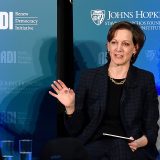We live in an era of declining faith in elected leaders, declining faith in the institutions of the West, declining faith in democracy itself. In the United States, the world’s most important democracy, Congress seems permanently deadlocked, in hock to moneyed interests, unable to grapple with the big issues of climate change, technological change, the information revolution. In Britain, one of the world’s oldest democracies, politicians now speak in an offhand way about “proroguing” Parliament — asking the queen to suspend Britain’s House of Commons — as a way of resolving the unresolvable problem of Brexit.
Nor is the problem confined to the Anglo-Saxon world. A couple of years ago, two political scientists, Yascha Mounk and Roberto Stefan Foa, looked at the numbers in a now famous article and found that the number of people who believe that it is “essential” to live in a democracy has slipped in almost every Western country. The trend is especially pronounced among the young. Among Swedes born in the 1930s and 1940s, just to take one random example, more than 80 percent believe democracy is “essential.” Among Swedes born in 1980, however, the figure has fallen to 60 percent. At the same time, several established democracies, from Hungary to India, have begun dismantling fundamental institutions and principles, including independent courts — a democratic deconsolidation that doesn’t even arouse the interest of this U.S. administration.

